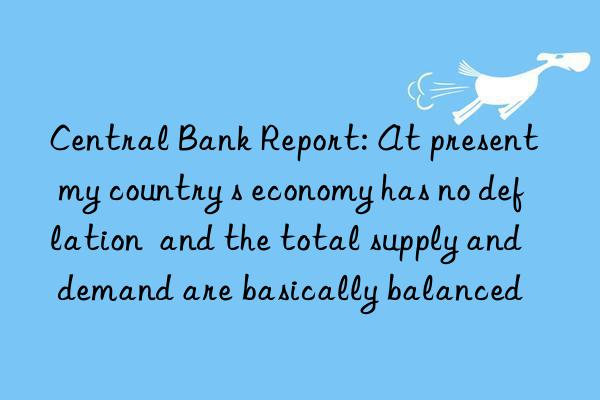
According to a report released by the People's Bank of China on the 15th, there is currently no deflation in my country's economy. In the medium and long term, my country's overall economic supply and demand are basically balanced, monetary conditions are reasonable and moderate, residents' expectations are stable, and there is no basis for long-term deflation or inflation.
Since the beginning of this year, the price increase in our country has come down in stages. In April, the national consumer price index (CPI) rose by 0.1% year-on-year, a decrease of 0.6 percentage points from the previous month; the national industrial producer price index (PPI) fell by 0.5% month-on-month, a year-on-year decrease of 3.6%.
According to the report on China's monetary policy implementation for the first quarter of 2023 released by the People's Bank of China on the same day, deflation mainly refers to the continuous negative growth of prices and the downward trend of money supply, which is usually accompanied by economic recession. my country's prices are still rising moderately, especially the core CPI is stable at around 0.7% year-on-year, the growth of broad money (M2) and social financing is relatively fast, and the economic operation continues to improve, which does not conform to the characteristics of deflation.
The report shows that in the first quarter, my country's new RMB loans were 10.6 trillion yuan, an increase of 2.27 trillion yuan year-on-year; at the end of March, the stock of RMB loans, M2, and social financing scale increased by 11.8%, 12.7% and 10% year-on-year respectively.
The report pointed out that since the beginning of this year, the price increase has dropped in stages, which is mainly related to the time difference between supply and demand recovery and the base effect. The production, distribution, circulation, and consumption of the real economy have their own processes. In addition, the "scar effect" of the epidemic has not yet subsided. The transformation of residents' excess savings into consumption is restricted by the differentiation of income distribution and unstable income expectations, especially for automobiles, home improvement, etc. And other bulk consumer demand is weak. The recent phenomenon of early repayment of loans by residents has also affected current consumption to a certain extent.
According to a person from the People's Bank of China, my country's CPI has experienced a periodical downward trend many times, but none of them have significantly affected the overall trend of macroeconomic operation. In general, if the economy maintains a normal growth trend, the impact of the periodic decline in CPI should not be exaggerated. From May to July this year, the CPI will remain low for a period of time. However, as the base decreases, especially the policy effect will further emerge, the market mechanism will play a full role, and the endogenous power of the economy will also increase. The gap between supply and demand is expected to tend to be bridged. The CPI center may rise moderately in the second half of the year, and may return to near the average level in recent years by the end of the year.
The report shows that in the next stage, the People's Bank of China will continue to implement a prudent monetary policy with an appropriate amount and a stable pace, improve the quality and efficiency of supporting the real economy, strengthen coordination and cooperation with fiscal policies, form a joint force to expand demand, and promote The economy continued to improve and prices remained basically stable.



 微信扫一扫打赏
微信扫一扫打赏
